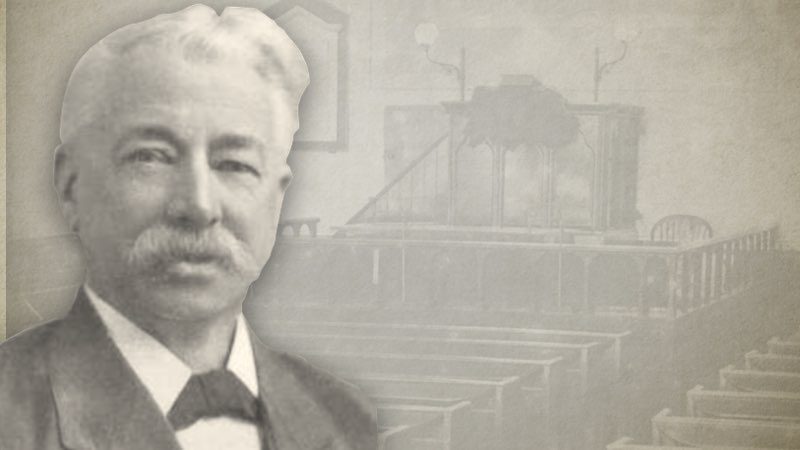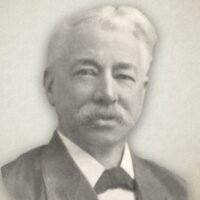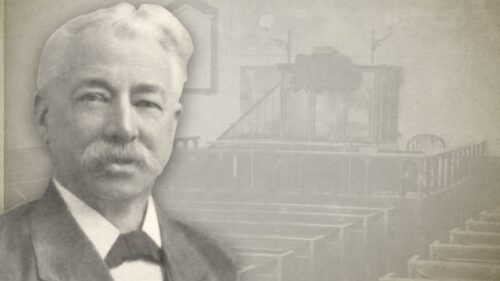
Building In Troublous Times
A Sermon Preached By John Booth At Providence Chapel, Croydon, On Sunday Morning, November 20th, 1904.
There is no doubt at all that Daniel prayed to God on behalf of Jerusalem. It is always a trying time to God’s people when they see Zion in a low place. Daniel was constrained to pour out his heart to God. While he was breathing out his prayer to the Lord, the Lord sends a man Gabriel to him about the time of the evening oblation. Among other things spoken by the angel was our text: “The street shall be built again, and the wall, even in troublous times.” If you wish to see the fulfilment of these words read Nehemiah 4, which we have just had as our lesson. You will see there about the building of the wall of Jerusalem, and that it was done in troublous times.
We find in Nehemiah 1 that he prayed and fasted and made supplication to God. There is one thing I observe here; Nehemiah looked very mournful when he went in to the king, whose cup-bearer he was, and the king noticed his sad countenance. He was not naturally a gloomy man, but the trouble his country was in caused him to look depressed. The king noticed the sadness of his countenance, and asked the cause of it. Immediately prayer ascended from Nehemiah*s heart even before he answered the king. Then he explained the sad state of his native country, and in that very moment his prayer was answered. Our God is a prayer-hearing and prayer- answering God. Real prayer is not vain repetition; sometimes it is a sigh, sometimes a groan, sometimes a tear. In a moment the king granted Nehemiah those things needed for the restoration of Jerusalem, and he soon went forth with his men to Jerusalem, and began to build the wall. And we read that “when Sanballat and Tobiah heard of it, it grieved them exceedingly that there was come a man to seek the welfare of the children of Israel.” It is surprising sometimes how other people grieve when a man arises to seek the true prosperity of Zion. But these enemies of Nehemiah said, ” What do these feeble Jews ? “—what will the people do, they are so weak ? This question is asked to-day about the people of God. “What can they do?” they say; “they are very weak and feeble; they have no organ and no attractions; what can they do? They have no societies to train up the young and develop them into Christians.” None are wanted, though we know that God does use means of His own appointment.
Do not let us be much discouraged because we realise our weakness. The Apostle Paul says, “When I am weak, then am, I strong.” What can the people of God do? When God is behind a weak saint there is no saying what he will do. Many times we may be afraid our religion will not live for a day; Satan tells us so, and the world tells us that we are sure not to endure because we are so weak and feeble. Usually those who fear this endure to the end. Those who go on in false confidence make an end of their faith, as we read of some who ” concerning their faith have made shipwreck,” because it was not a God-given faith. But those who have a right faith and right desires often fear they will not be accepted. If God looked as we look, perhaps He would not accept us. We forget that a broken and a contrite heart in the sight of God are of great price.
“The street shall be built again, and the wall, even in troublous times.” It seems sometimes to me as though Judah adds to the weight of Sanballat and Tobiah’s opposition, and almost despises the burden-bearers of the wall; even they are apt to say, “What do these feeble Jews?” “And Judah said, The strength of the bearers is decayed, and there is much rubbish, so that we are not able to build the wall.” In our day people say the same. They say, “We do not have such burden-bearers as there were in former times.” I admit that there is a weakness in the ministry now; there are many weak ministers, but I do not think their weakness is anything to be compared to the weakness of the hearers of to-day. And God usually uses weak instruments when He has work to be done. But notwithstanding all these things, the wall sliall proceed, it shall advance and be built; though the burden-bearers receive many a blow ” from sinner and from saint.”
“And the street shall be built again, and the wall, even in troublous times.” It is easy for us to imagine how the path which lay between Jerusalem and Babylon would be overgrown with weeds, and covered with stones, or there would not be the direction to “gather out the stones.” There was no traffic, and the path was blocked; there was heed for a street to be made and a wall built, though in troublous times.
It is possible that Daniel was speaking of another street; there is a twofold message here. Gabriel not only taught how the street was to be built, but there was a promise given that it should be built, though there was no present sign of its accomplishment, it should be done. “The street shall be built.”
I believe that real God-given faith always rests on the Word of God; no matter how long it is before God fulfils His word, His promise stands sure. Do not think that you: have a right faith if there is nothing in the mercy of God, nothing in Christ that your faith can look to and hang on. There is something firm, something fundamental in real faith. When it thus rests assured that the promise will be fulfilled, it is God-given faith. Faith will plead that word that God has given.
“The street shall be built again, and the wall, even in troublous times.” This was encouraging to Daniel. But there is another aspect of this word. It not only teaches us about temporal things, but it shews us the way to heaven. And we can never see the way to heaven unless we have Divine light. The Psalmist says, “The entrance of Thy word giveth light.” Naturally we are all darkness, and no light of nature can compensate for the lack of Divine instruction. If we know a single inch of the way to heaven it has been revealed to us by the Holy Spirit. If we consider this as a spiritual way it implies also that the way is blocked. There is no way to reconciliation, no way to heaven, no way to glory, by anything we can do.
God made man upright, and put him in the Garden of Eden, and he could then have fellowship with God. But man fell, and immediately there was a distance between him and God; his conscience became guilty, and this made him seek a way to God. But there can be no fellowship between God and man until there is reconcilia- tion. If a man is rightly taught his sinnership, he realises his distance from God, he sees that there is a barrier, and realises that the way to God is blocked. He may, as Cain did, bring the fruits of the earth for an offering, but that is no way to God. As he brings his Pharisaic rites he may endeavour to pave the way, to open up the street by something he can do, something he can give, or something he can practise; but sooner or later he will find to his confusion that this is not paving an inch of the way.
“The street shall be built again “—this speaks of the Lord Jesus Christ. He shall be called, “The repairer of the breach, the restorer of paths to dwell in” (Is 58:12). The poor sinner wants a path to walk in, he wantp leading “beside the still waters.” You will find that all your efforts are abortive; all fail, unless faith is given you to see Him who is the Way, the Truth, and the Life. We read: “Having therefore, brethren, boldness to enter into the holiest by the blood of Jesus, by a new and living way, which He hath consecrated for us, through the veil, that is to say, His flesh; and having an high priest over the house of God; let us draw near with a true heart in full assurance of faith.” Every person who ever came tp God acceptably, came by that new and living Way. Jesus Christ is the Person who makes up the way and builds the street. He makes a way, and puts us in the way. He makes access to God.
This is a narrow way. Some people are satisfied if only they have a name to live, and can appear right before men; but the poor distressed soul wants to feel that he is right with God. His whole desire is, “Am I right? Am I a Christian? Shall I persevere? Shall I overcome?” For only those who overcome shall inherit all things.
“The street shall be built again,” though Adam fell, and though we fell in him, and have sinned ourselves. Some may try—the Pharisees try, the Papists may try, but it is all in vain—to make a way to Paradise; it is blocked by a flaming sword, and we cannot get by it. And I believe that every soul goes there first; all try to fulfil God’s law, but they find they cannot do a single thing, and at last fall upon this Stone—Jesus Christ; then we find that the distance has been bridged. None can bridge it but One, and He can.
If we read the history of this people, the people of Israel, we see that they could not find a way to come out of Egypt; there was no way. Moses could not have devised a way whereby poor slaves could have come out of Egypt, but God made a way. He made a dry path through the Red Sea. I sometimes think that if we had been watching the two peoples—the Israelites and the Egyptians—coming into the path of the Red Sea, we should not have been able to discern the difference between them; we could not have told which had faith and which had presumption. The motive power of one was the faith of God’s elect; of the other, presumption. Many acts seem alike, but some proceed from faith and some from nature. It was a God-made way; so it is with the way to glory, and so it is with the fellowship we have with God through Christ. I sometimes think that God’s people own grace in the first place, and trust in their own strength in the second. If you have ever been profited in any way in your soul it was all of God’s grace. Many times there is a distance felt between you and God. Neither can you ever get to God, however much nature is thrown into religion, unless you go through Christ.
“The street shall be built again.” Street here signifies access to God. A street naturally is that whereby you get from your house to your friend’s; but if there was a flood in the street, you would not be able to make use of it. So it is spiritually; the soul that has been convinced of sin cannot get to God; the street is blocked by which we enter, and access must be made by God’s eternal Son.
“And the wall, even in troublous times.” The wall denotes the Church; if we are God’s people, we are living stones in that temple, in that wall. Naturally all God’s people, are buried with rubbish; the Lord comes right down into the mud and mire, and takes His jewels and puts them into His crown. “In troublous times.” This is true of the Church as a whole, and it is true of an individual. I am prepared to say that if ever you have been built rightly and securely, it has been done in trouble. But you may say that you pray for the peace of Jerusalem, Contentions may appear, but mind, the wall is being built. Yet the Church when built is built in troublous times. Christ from a babe, throughout all His mission, carried it on in trouble; He was “a Man of sorrows, and acquainted with grief.” He raised up the tabernacle of David, for He came to raise it up. So when God began to work in your heart, if it was like it was in mine, it was done in trouble. I remember for the first three years when God began to teach me, I thought He was going to make an end of me. During that time we lost three boys, and just after the last one was taken my wife was struck down with rheumatic fever, and I was only a labourer in a factory, earning 15s. a week.
A poor soul feels that he cannot stand, but he will, for the everlasting arms are underneath. There is Divinity beneath him, there is Divinity around him, there is Divinity above him, and there is Divinity within him. “The street shall be built again,” for “salvation shall God appoint for walls and bulwarks;” and God’s appointment is sure to stand. “Even in troublous times.” During this year you have had trouble no doubt, but what lias it done? Has it not cemented you together? Trouble does this if it is sanctified. There are many things I might add, but the time is gone. May God add His blessing. Amen.
John Booth (1861-1928) was a Strict and Particular Baptist preacher. He was appointed the Pastor of Zoar Particular Baptist Chapel, Bradford, a position he served for thirty years. Walter Brooke wrote of him:
“With mingled feelings of pleasure and sorrow I accede to the request to write a short Foreword to the memoir of the life of my late beloved and esteemed friend. His removal is a great personal loss to me, having walked in loving friendship with him for about thirty years. Un- broken fellowship is a choice and rare privilege in these days when misunderstanding too often sadly mars our communion. In dear John Booth one possessed a friend to whom the heart could be opened freely. And if one was compelled to differ in judgment, which in this present imperfect state is well-nigh inevitable at times, there was no fear of communion being in any degree interrupted. His mind was large enough to admit that the freedom he claimed for himself should be accorded to others. Many interesting, entertaining and profitable hours did we spend together in friendly argument and discussion. Of him as a preacher one needs not to say much, as his praise is in the churches. But having had the privilege of hearing him on several occasions, perhaps a little personal testimony may be seasonable. His style was very clear and concise; his remarks very direct and pointed. This was the result of much prayerful thought and careful study. Our friend was no loiterer in the Lord's vineyard. Here is a specimen of his terse and suggestive mode of teaching: I was listening to my esteemed friend on a special occasion, and as he read his lesson, on reaching the words, " Thy kingdom come, Thy will be done," he paused, and in a most forceful manner remarked, Do you know what that means ? That means, Crucify me.” What a volume of meaning appeared to me in these few words! His simplicity of purpose, and the fearless expression of his deep convictions, were marked features of his preaching. There was no mistaking his meaning. John Booth believed and acted upon the words of his Lord and Master, " And call no man your father upon the earth, for One is your Father which is in heaven; neither be ye called masters, for One is your Master, even Christ." He sought his message from his Lord, and delivered it " not with enticing words of man's wisdom," but that "which the Holy Ghost teacheth, comparing spiritual things with spiritual." His labours were indeed abundant. His heart was in his loved work, and he always aimed to give his hearers of his very best. During my long, painful affliction his tender sympathy was marked, and he believed the time would come when I should again testify of the grace and love of the Lord Jesus. And it is my great comfort that he was spared to know that his convictions were true. In September of last year we met in Sussex, and I then heard him preach, from Rev. 19:6: "And I heard as it were the voice of a great multitude, and as the voice of many waters, and as the voice of mighty thunderings, saying, Alleluia: for the Lord God omnipotent reigneth." How we rejoiced together! On hearing of his lamented end, my heart was gladdened amid the sorrow in reflecting that his ransomed soul had joined the heavenly host in singing " Alleluia!” May those who have taken in hand the production of this volume be cheered and encouraged by a quick and extensive sale. And may we who are left for a while to labour on, remember the word of exhortation: "Whose faith follow, considering the end of their conversation, Jesus Christ, the same yesterday, and to-day, and forever."
John Booth Sermons




